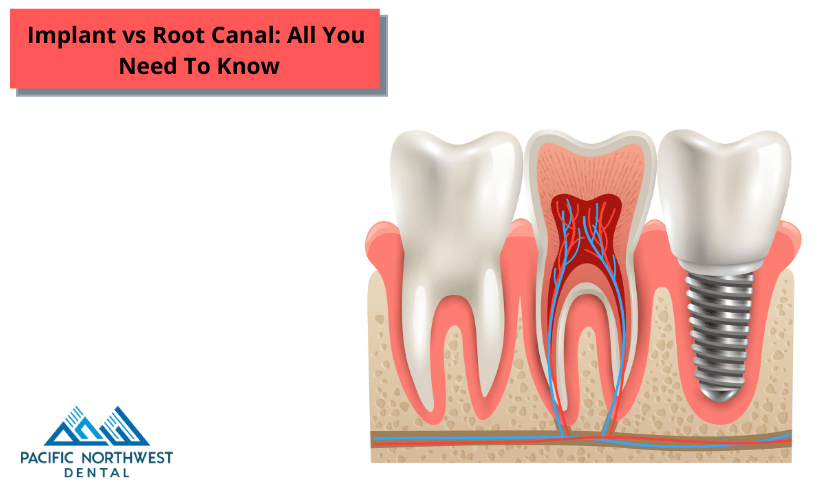
Do you have a tooth that aches or has a lot of decay? If this is the case, your dentist may advise you to receive a root canal or a dental implant to correct the problem.
Our dentist at Beaverton can help you with a root canal by removing the infected pulp and replacing it with a substitute substance. You can combine this therapy with a crown.
A dental implant causes the removal of your original tooth and places a metal post in your jawbone. Your dentist will then screw in a dental crown to allow you to chew normally.
Do you want to know whether a root canal or an implant is better for you? Continue reading this blog and decide which one you prefer.
The Advantages of a Root Canal
Here are some of the most important advantages of having a root canal with or without a crown:
You do not lose your natural tooth
When comparing a dental implant versus a root canal, the key advantage is that you keep your original tooth with a root canal, allowing you to maintain a natural grin. Of course, a crown may be required to repair serious deterioration.
It takes less time to complete the treatment
The root canal procedure is also less time-consuming than a dental implant. You’ll normally have one or two appointments and may have to wait a short time if a permanent crown is required.
The Procedure Is Almost Painless
Also, unlike what you may have heard, the root canal procedure is rather painless and has a short recovery period. Because we will not extract your tooth, you will not experience any pulling throughout the operation.
The Drawbacks of a Root Canal
While root canals provide many advantages, you should know the following disadvantages:
Your tooth may become sore for the procedure
Another disadvantage of a root canal is that there is some possibility that the tooth you want to save will not survive. Your dentist may discover that your tooth decay is so they cannot perform a root canal to save your tooth.
Complications can cause tooth loss
After-procedure complications are also possible. Abscesses, for example, can occur if not all of the infected pulp is removed. This may cause an extraction. Without insurance, they can become prohibitively expensive.
And while root canals are normally less expensive than implants, they can still be expensive. Your bills may become exorbitant if you require both a root canal and a crown.
The Advantages of a Dental Implant
Here are some advantages of a dental implant over a root canal:
The Aesthetics Are Still Outstanding
Even if you don’t preserve your native tooth, a dental implant can provide good aesthetics. Your dentist will meticulously craft the tooth and match the color to your other teeth so that it blends in nicely.
Your Tooth Will Work Properly
You also keep the high level of functioning that we accustom you to with your natural teeth. You can still eat the things you enjoy and won’t have any speech issues that certain dentures can bring. Even better, dental implants provide the same level of convenience as natural teeth.
Your implant should last you a long time
Dental implants can last considerably longer than a root canal and crown if you’re looking for a long-term solution. They have a low failure rate and can endure for decades if properly cared for. Even with a root canal, your tooth may fail or require crown replacement after five to fifteen years.
The Drawbacks of a Dental Implant
It would be great if you also considered the following disadvantages of receiving a dental implant before deciding:
The Treatment Process Is More Invasive and Time-Consuming
Another disadvantage is that receiving a dental implant is considerably more involved. First, you must get your natural tooth extracted and give time for your gums to heal. It would be best if you had multiple visits to prepare your jawbone for the procedure, but the implants, install your fake teeth, and monitor your recovery.
You’ll Need More Time to Recover
Because the procedure is intrusive, wait for your mouth to recover between treatment rounds. You’ll also have to deal with the associated pain and swelling, as well as change your diet to eat softer foods.
How to Decide between a Root Canal and an Implant
Finally, our dentist in Beaverton will assess your dental needs and assist you in deciding between a root canal and an implant. Your budget, dental issue, and personal preferences will frequently influence your decision. If your tooth has extensive decay and you’re willing to accept the higher expense and more complex process, an implant may be the preferable option in the long run. However, if you wish to preserve your tooth and know the dangers, a root canal can be less expensive and less invasive. We are one of the best dentists in Beaverton and are ready to assist you with choosing a root canal or an implant.
Hope this blog gives you a clear idea of choosing a root canal or an implant. If you want to know more, call Pacific NorthWest Dental to get the appropriate treatment you need.
